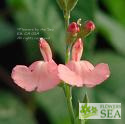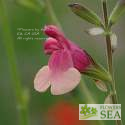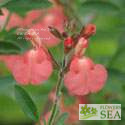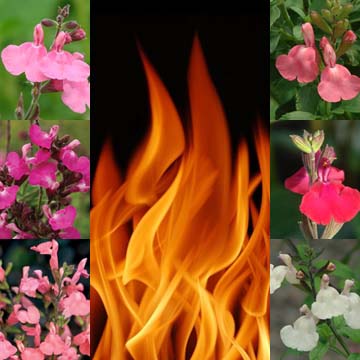(Glow Peach Mountain Sage) Long blooming Salvia microphylla 'Heatwave Glow' produces prolific quantities of soft peach-to-apricot blossoms along with dense, mid-green foliage.
This tough plant is a cross of Southwestern Mountain Sage and the Texas native Autumn Sage (Salvia greggii).
Flowers by the Sea grows ten Heatwave varieties, which the Melbourne-based Plant Growers Australia team of Howard Bentley and Steve Eggleton hybridized for hot, dry conditions throughout their nation.
Similar to their parent species, Heatwave Salvias are adaptable to cooler coastal regions. They grow particularly well in a Mediterranean dry summer/wet winter climates, such as in Melbourne and California. All Heatwave sages are compact and have the dense foliage of Mountain Sage rather than the airy look of Autumn Sage.
Glow Peach Mountain Sage needs only occasional deep watering once established, but also thrives with average watering based on local rainfall. It requires full sun, yet appreciates a bit of shade in areas with extreme heat. As to soil, it isn't finicky except for good drainage.
Heatwave Salvias are ideal for borders, pathways and container planting -- settings which allow you to enjoy the pleasant fragrance of their foliage up close.
If you are designing a wildlife garden, Glow Peach Mountain Sage is a fine choice, because it attracts bees and hummingbirds yet discourages deer.
(Dyson's Orangy Pink Hybrid Jame Sage) Many Salvia x jamensis hybrids remind gardeners of sunrise, such as Dyson's Orangy Pink. Light green calyxes faintly striped with red cup its luminous pale salmon pink blossoms with creamy throats.
(Shell Dancer Sage) So many sages combine resilience and loveliness. This includes Salvia 'Shell Dancer', which withstands heat and drought yet has delicate looking blossoms and lush green foliage.
(Tangerine Ballet Hybrid Jame Sage) Soft pinkish-orange flowers with contrasting yellow eyes make this Jame Sage look as tasty as sorbet. Hardy to at least 10 degrees F, Tangerine Ballet is also heat tolerant, drought resistant and long blooming-- all marks of Salvias in the closely related Autumn and Mountain Sage group.
Send to friend
Posted: Friday, February 13, 2015
Synopsis:
Waterwise landscapes don't have to be cactus gardens if you grow leafy, colorful drought-resistant Salvias, such as Australian Heatwave™ Mountain Sages, which are crosses of Salvia microphylla and S. greggii. Hybridizers Howard Bentley and Steve Eggleton of Plant Growers Australia used these tough American and Mexican native plants to create their series. One goal was to aid water conservation during their nation's hot, dry summers.
Read the Article
Colors
RHS# 11C
RHS# 29C
RHS# 33C
RHS# 144C
RHS# 143A
Learn more about how we analyze plant colors
We based our analysis of this plant’s floral and foliar color on the internationally standardized color system published by the U.K.’s Royal Horticultural Society. Called the RHS Large Colour Charts, this publication is a boxed set of color swatches arranged in fans and containing all the colors that RHS has identified in horticulture. RHS gives each color a common name and code number.
Each swatch has a small hole punched into it. We place the swatch over a flower petal and compare the blossom’s color to that of the card. When using RHS colors to compare plants that you want to combine in a flowerbed, in bouquets or in some other manner, RHS says to view them indoors in north light. If you are matching our digital swatches to flowers already in your garden, pluck two or three fully open blossoms of each plant that requires analysis.
You may find that the plant you receive from FBTS varies somewhat in color from what appears in our color analysis or our photograph due to a number of factors, including:
- Variations in photographic colors based on lighting level at different times of day
- Differences in the resolution of digital screens
- Seasonal changes in plant color due to changes in temperature and plant cycle and
- pH or soil chemistry that varies from one locale to another and causes color shifts.
Finally, RHS notes that you shouldn’t attempt color matching when your eyes are fatigued.
Here are some guidelines for success with this plant in your garden.
Click on an individual icon for more detailed information.
Exposure
This plant needs or tolerates more than six hours of intense sunlight daily. Many Salvias only thrive in wide-open locations where they receive long hours of full sun. However, full-sun species sometimes tolerate a bit of partial shade. Or a Salvia that loves partial shade may be amenable to spending part of its time in full sun.
In general, this sun/shade adaptability shows up in Salvias that do best in cooler climates when grown in full sun and thrive in hot climates when partial shade is available. So full-sun Salvias sometimes are also categorized as partial-shade plants and vice versa.
This plant can handle extreme heat.
Full-sun Salvias that don’t like any shade are among the most heat tolerant. Heat-loving Salvias also are often drought tolerant. Moisture-conserving features, such as fuzzy leaves, help them stay perky at high temperatures.
Heat-tolerant Salvias are fine choices for western and southern exposures.
This plant grows well in partial shade, such as the kind on the edge of woodlands or under deciduous trees with breaks in the foliage through which dappled sunlight penetrates. Many Salvias thrive in partial shade, including ones that spend part of their day in full sunlight. Some species need partial shade to overcome severe heat and dry soil.
Garden Uses
This plant grows well in an outdoor container, such as on a patio.
Some containerized Salvias leaf out and flower year after year following a period of dormancy. Annuals in containers may die back and appear to grow again when they reseed.
During extreme heat, check the soil in container plantings once or twice daily to be sure it doesn't completely dry out. Feel its surface for coolness, then gently poke a finger into the soil to check for dryness.
Growing Habit
Plant hardiness Zones defined by the U.S. Department of Agriculture tell you the minimum temperatures a plant can withstand in your garden. The USDA divides the nation into winter climate areas from coldest (Zone 1) to warmest (Zone 11).
However, it is sometimes possible to grow a Zone 6 Salvia as a perennial in Zone 5 if you provide preferential care, such as winter mulching and a location sheltered from harsh winds. In contrast, a Zone 9 Salvia may act like a perennial in Zone 10 if given a bit of shade or extra water.
To create a harmonious landscape plan, it is important to consider the heights of individual plants.
Height also affects function. Short Salvias often make excellent ground covers that conserve soil moisture and discourage weeds while also brightening your yard. Medium-height Salvias, such as ones 36 inches tall, often are ideal border plants. A tall Salvia planted singly can highlight a landscape; multiple plantings can form an attractive screen.
By considering the width of a plant, you can determine how many to place in a row or what other plants to grow with it.
For example, a narrow, moderate-height Salvia may look good interplanted with bushier species, kind of like Mutt and Jeff.
In contrast, wide-spreading Salvias are economical for hiding lengths of wall and fence or for creating hedge-like divisions in a yard.
Plant this herbaceous species in the USDA Zones where it grows as a perennial, returning year after year.
After dying back to the ground at frost, herbaceous perennials emerge in the Spring with soft, new growth. A Salvia that is perennial in one region, may be an annual in another depending on local conditions, such as winter temperatures.
If you live in USDA Zone 5, for example, Salvias in our catalog cited as growing well in Zone 5 or lower will be perennial. Those cited as doing well in Zones 6 or higher may do well in Zone 5, but generally will act like annuals coming back from seed instead of the parent plant’s roots.
Shrubs are characterized not only by bushy foliage but also by woody stems.
Shrubby Salvias may be evergreen or deciduous. Some Winter-blooming, deciduous species lose their foliage during hot weather. Some Salvias, classified as subshrubs, have a combination of woody and tender, herbaceous growth.
Salvia shrubs range from tall, upright species to ground covers of short to moderate height. Their spread may match or exceed their height
Water Needs
In the right locale, this plant survives and thrives despite minimal summer water.
Drought resistance is an important characteristic of xeriscapic – dry landscape – plants, a category that includes a multitude of Salvias. Many low-water Salvias are native to parts of the world with little rainfall all year or regions where summers are dry and winters are wet.
Nevertheless, there are also drought-resistant Salvias for places such as Florida where winters are dry and summers are wet.
This plant thrives on or at least tolerates lots of water, especially when soil is well drained. They are generally not suitable for poorly drained soils.
A number of Salvias hold up well in areas where rainfall is a regular occurrence. Some even tolerate boggy conditions but only for a brief time. These are usually top-notch plants for regions of the country, such as the Southeast, where summers are soggy.
Blooming Season
This plant reaches peak bloom in Fall or flowers for much of the season.
It may begin flowering much earlier in the year. Bloom time for some Salvias lasts from Spring till first frost. Others begin flowering in Summer and continue into Fall. There are also Salvias that don’t bloom until late Fall and continue into Winter if grown in mild-Winter areas.
There is a great deal of overlap in blooming seasons for Salvias.
This plant reaches peak bloom during Spring or flowers for much of the season.
However, it may begin flowering sooner. Some Spring-blooming Salvias begin flowering in Winter; others start in Spring, keep producing color through summer and may continue on into autumn and first frost. Still others flower only in Spring.
There is a great deal of overlap in blooming seasons for Salvias.
Wildlife
Honeybees love this plant’s nectar. As a honeybee burrows down into a Salvia’s nectar-rich flowers to reach dinner, it accidentally gathers pollen and drops it on the stigma of that blossom or of ones on other nearby Salvias. Fertilization results in seed production.
By growing honeybee favorites, you attract these helpful pollinators to all your flowering plants and increase productivity
Unless local forage is in short supply, most deer likely will avoid this plant.
It appears that deer dislike Salvias, in general, due to their volatile oils that make the plants so fragrant and savory in cooking. However, the only completely deer-proof plants are the ones grown beyond reach.
Based on our experience and reports from customers, hummingbirds (Trochilidae spp.) love this plant.
Hummingbirds exist only in the Americas where their 300-plus species are particularly fond of the nectar in brightly colored Salvias from the Western Hemisphere. However, if favorites aren’t available, they dine on the nectar of most Salvias.
Hummingbirds repay thoughtful plantings by helping to pollinate your garden




